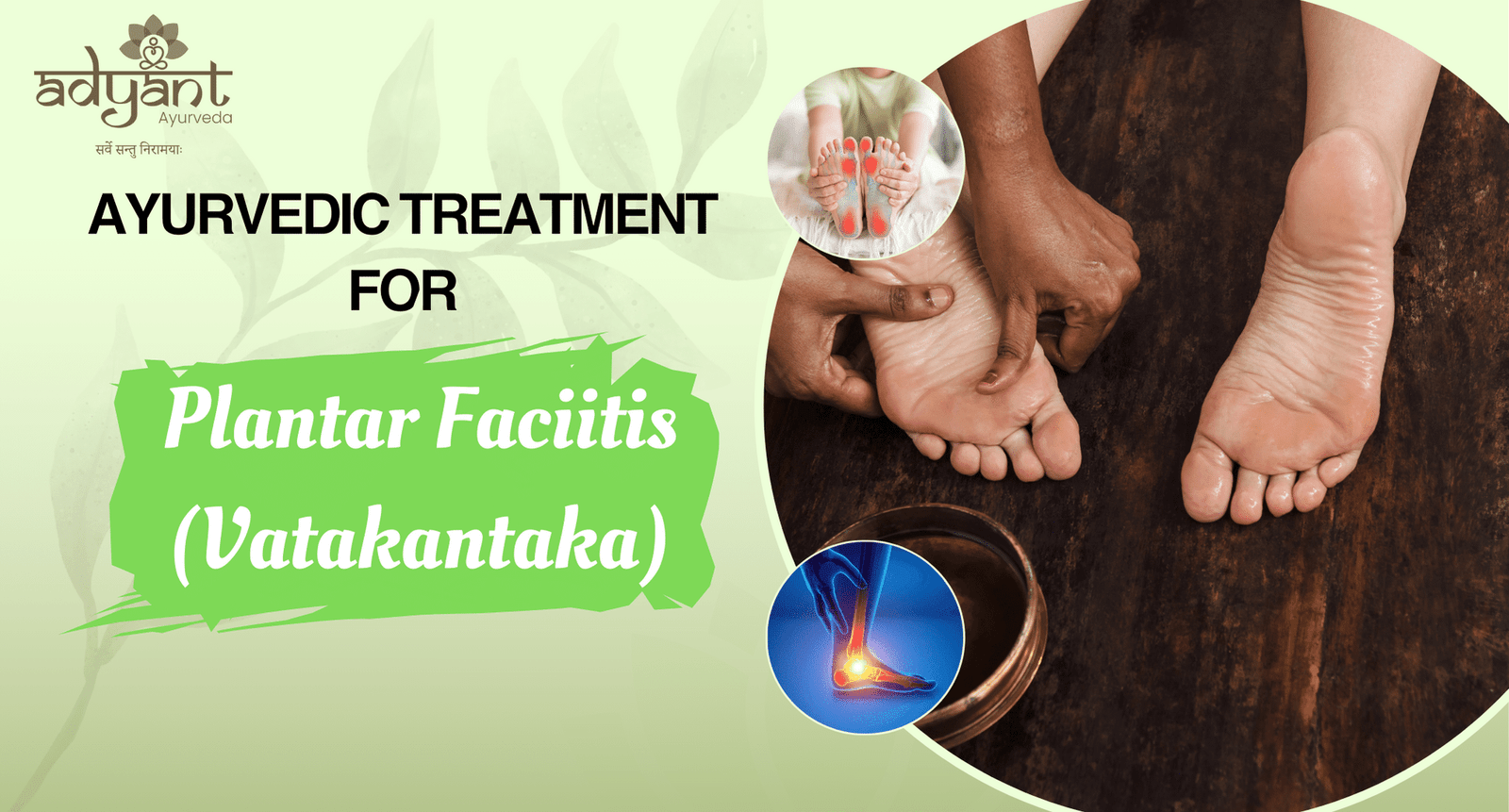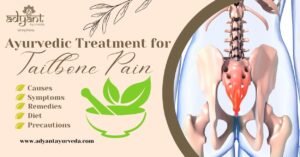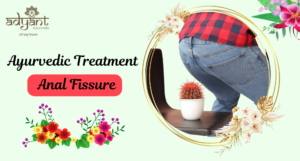
Ayurvedic Treatment for Plantar Fasciitis (Vatakantaka): Plantar fasciitis can be a debilitating condition, causing intense pain in the heel and foot. In Ayurveda, this is often seen as a manifestation of imbalances in the body’s doshas, particularly Vata and Kapha. Ayurvedic treatments for plantar fasciitis aim to address these imbalances holistically, providing relief from pain and promoting healing. At Adyant Ayurveda, we offer comprehensive Ayurvedic solutions tailored to each individual’s unique constitution and condition.
Get a Free Consultation By Downloading Our App “AyurCare“
Understanding Ayurvedic Treatment for Plantar Fasciitis in Ayurveda
Plantar Fasciitis: This condition is known as “Vatakantaka” in Ayurveda, where Vata dosha plays a significant role in causing pain and inflammation in the plantar fascia, the thick band of tissue that connects the heel to the toes.
Ayurvedic Treatment for Plantar Fasciitis: Symptoms
According to Ayurveda, the symptoms of plantar fasciitis (known as “Vatakantaka” in Ayurvedic terms) include:
- Sharp Heel Pain: Patients may experience a sharp, stabbing pain in the heel, especially during the morning or after periods of rest.
- Increased Pain with Movement: The pain in the heel may worsen with movement, such as walking or standing for long periods.
- Stiffness: The affected foot may feel stiff, particularly after prolonged periods of inactivity.
- Tenderness: The area around the heel and along the arch of the foot may be tender to the touch.
- Difficulty Walking: Severe cases of plantar fasciitis can cause difficulty in walking or bearing weight on the affected foot.
Ayurvedic Treatment for Plantar Fasciitis includes balancing Vata Dosha. These symptoms are often indicative of an imbalance in Vata dosha, which plays a significant role in the development of plantar fasciitis according to Ayurvedic principles.
You May Also Like: Ayurvedic Doshas: Vata, Pitta, Kapha
In Ayurvedic perspective, here are some home remedies and herbal remedies for treating plantar fasciitis:
Ayurvedic Home Remedies for Planter Fasciitis
Discover effective home remedies for plantar fasciitis to relieve pain and promote healing naturally. Learn about ice packs, stretching, massage, and more.
Here are some important Home Remedies to treat plantar fasciitis.
- Warm Water Soak: Soaking the feet in warm water with a pinch of rock salt can help reduce pain and inflammation.
- Epsom Salt Bath: Adding Epsom salt to a foot bath can relax muscles and ease discomfort in the heel.
- Foot Massage: Massaging the affected foot with warm sesame oil or coconut oil can improve circulation and relieve tension.
- Ice Pack: Applying a cold compress or ice pack to the heel can reduce swelling and numb pain.
Herbal Remedies for Plantar Fasciitis
Ayurvedic Treatment for Plantar Fasciitis includes effective herbal remedies, including turmeric, and ginger. Discover natural ways to reduce pain and inflammation.
Here are some important Herbal Remedies for treating plantar fasciitis.
- Turmeric Paste: Mixing turmeric powder with water to form a paste and applying it to the heel can have anti-inflammatory benefits.
- Ginger Tea: Drinking ginger tea or applying grated ginger poultice to the affected area can help reduce pain and inflammation.
- Ashwagandha Capsules: Consuming Ashwagandha capsules or powder as per Ayurvedic guidance can support overall healing and reduce discomfort.
- Triphala Decoction: Boiling Triphala powder in water to create a decoction and using it for foot soaks can aid in reducing inflammation.
Why choose Adyant Ayurveda for Ayurvedic Treatment for Plantar Fasciitis in Bangalore, Karnataka, India?
Choosing Adyant Ayurveda for Ayurvedic Treatment for Plantar Fasciitis can offer several advantages:
- Expertise: Adyant Ayurveda has experienced Ayurvedic doctors who specialize in musculoskeletal conditions like plantar fasciitis. Their expertise ensures accurate diagnosis and effective treatment plans.
- Personalized Care: The treatment approach at Adyant Ayurveda is tailored to each individual’s unique constitution, ensuring personalized care and targeted therapies.
- Comprehensive Approach: Adyant Ayurveda adopts a holistic approach to healing, combining traditional Ayurvedic therapies with modern techniques for optimal results.
- Natural Remedies: Adyant Ayurveda emphasizes the use of natural herbs, oils, and lifestyle modifications in treatment, minimizing the risk of side effects.
- Patient Education: Adyant Ayurveda educates patients about their condition, treatment options, and preventive measures, empowering them to take control of their health.
- Long-Term Benefits: By addressing the root cause of plantar fasciitis and promoting overall well-being, Adyant Ayurveda aims for long-term relief and improved quality of life.
- Reputation: Adyant Ayurveda has a reputation for providing high-quality care and positive outcomes for patients with various health concerns, including musculoskeletal disorders like plantar fasciitis.
Overall, choosing Adyant Ayurveda ensures expert care, personalized treatment, and a holistic approach to healing plantar fasciitis and other health conditions.
Book Consultation Now with the Best Ayurvedic Doctors in Bangalore
Ayurvedic Diagnosis and Treatment Approach for plantar fasciitis
Ayurvedic Diagnosis: Our best Ayurvedic doctors for Plantar Fasciitis at Adyant Ayurveda conduct a thorough assessment to determine the individual’s doshic imbalance and the root cause of plantar fasciitis.
Treatment Approach: Ayurvedic treatment for plantar fasciitis focuses on pacifying Vata dosha and reducing inflammation in the affected area. Our treatments may include:
- Panchakarma Therapy: This detoxification procedure helps eliminate toxins from the body and restore doshic balance. Specific therapies like Abhyanga (herbal oil massage) and Swedana (herbal steam therapy) are beneficial.
- Herbal Remedies: Internal medications containing herbs like Ashwagandha, Guggulu, and Shallaki are prescribed to reduce pain and inflammation.
- Dietary Recommendations: A Vata-pacifying diet, including warm, nourishing foods and herbal teas, is recommended to support healing from within.
- Lifestyle Modifications: Our experts advise on lifestyle changes such as gentle exercises, proper footwear, and stress management techniques to prevent recurrent episodes of plantar fasciitis.
Adyant Ayurveda’s Holistic Approach to Healing
At Adyant Ayurveda, we believe in treating the root cause of the condition rather than just addressing the symptoms. Our experienced Ayurvedic doctors work closely with patients to create personalized treatment plans that integrate traditional Ayurvedic therapies with modern techniques for optimal results.
Benefits of Ayurvedic Treatment for Plantar Fasciitis
Discover the benefits of Ayurvedic treatment for plantar fasciitis, including herbal remedies, personalized care, and holistic healing approaches. Reduce pain and inflammation naturally.
- Natural Healing: Ayurvedic treatments focus on natural remedies and lifestyle modifications, promoting long-term healing without harmful side effects.
- Individualized Care: Each patient receives personalized care based on their unique constitution and health goals.
- Comprehensive Approach: In addition to relieving pain, Ayurvedic treatment addresses the underlying imbalances to prevent future occurrences of plantar fasciitis.
- Holistic Well-being: By restoring doshic balance and promoting overall well-being, Ayurvedic treatment enhances not just physical health but also mental and emotional wellness.
Conclusion
Plantar fasciitis can significantly impact daily activities and quality of life, but with the right Ayurvedic treatment approach, relief and healing are possible. At Adyant Ayurveda, we combine ancient wisdom with modern expertise to provide effective solutions for plantar fasciitis and other musculoskeletal conditions. Experience the benefits of Ayurveda and take a step towards holistic wellness today.
Red Other Related Blogs:
- Ayurvedic treatment for Osteoarthritis
- Ayurvedic Treatment for Joint Pain
- Ayurvedic Treatment for Joint Pain at Your Home
FAQs Related to Ayurvedic Treatment for Plantar Fasciitis
Ques: Is Ayurvedic treatment effective for plantar fasciitis?
Ans: Ayurvedic treatment can be effective for plantar fasciitis as it addresses the root cause of the condition, balances doshas, and promotes natural healing. However, individual results may vary, and it’s essential to consult with an Ayurvedic practitioner for personalized guidance.
Ques: What Ayurvedic herbs are used for plantar fasciitis?
Ans: Ayurvedic herbs commonly used for plantar fasciitis include Ashwagandha, Guggulu, Shallaki (Boswellia), Turmeric, and Triphala. These herbs have anti-inflammatory, pain-relieving, and healing properties that can benefit the condition.
Ques: How long does it take to see results with Ayurvedic treatment?
Ans: The time to see results with Ayurvedic treatment for plantar fasciitis can vary depending on the severity of the condition, individual constitution, and adherence to treatment protocols. Some individuals may experience relief within a few weeks, while others may require longer-term treatment.
Ques: Can Ayurvedic treatment prevent the recurrence of plantar fasciitis?
Ans: Ayurvedic treatment focuses on addressing underlying imbalances and promoting overall well-being, which can help prevent the recurrence of plantar fasciitis. Following a healthy lifestyle, including proper diet and exercise, as recommended by Ayurvedic principles, can also contribute to preventing recurrence.
Ques: Are there any lifestyle changes recommended along with Ayurvedic treatment?
Ans: Yes, Ayurvedic treatment for plantar fasciitis often includes lifestyle changes such as wearing supportive footwear, practicing gentle exercises like yoga, maintaining a balanced diet, managing stress, and avoiding activities that exacerbate pain. These lifestyle modifications support the healing process and prevent further aggravation of the condition.





